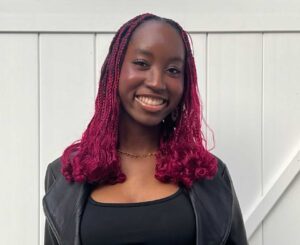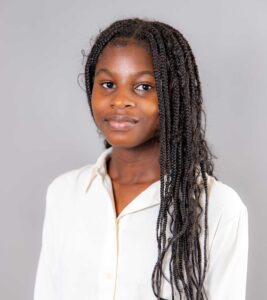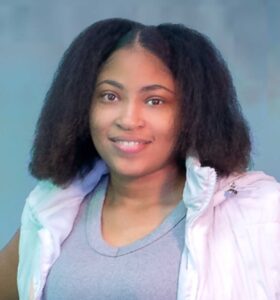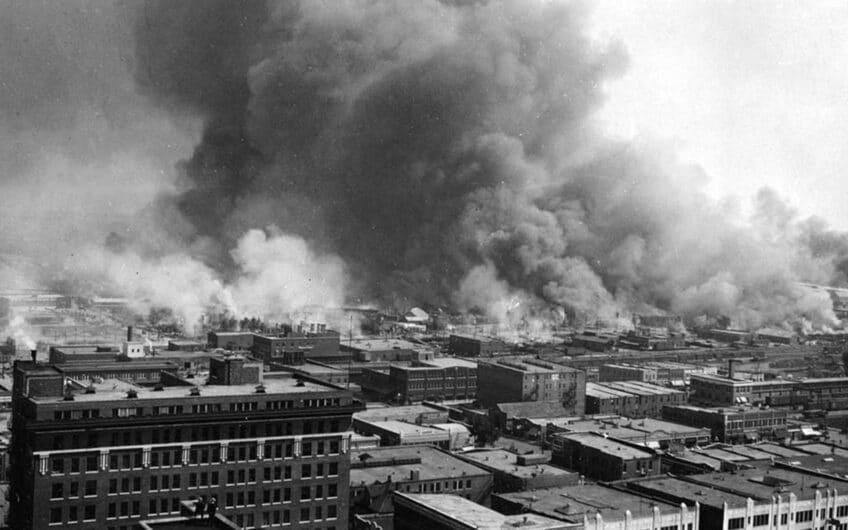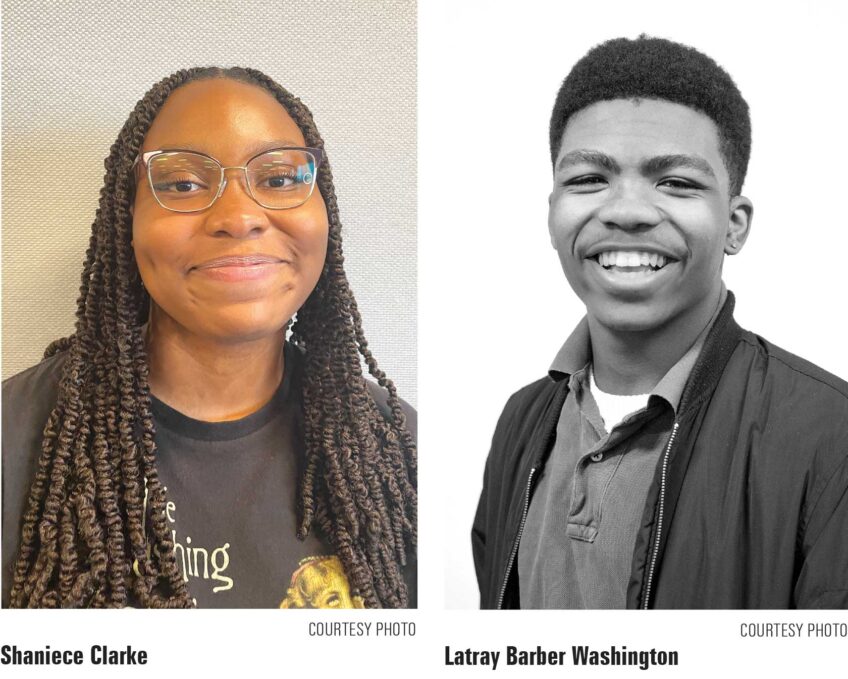New perspectives on Black History from WriteBoston’s Teens In Print program
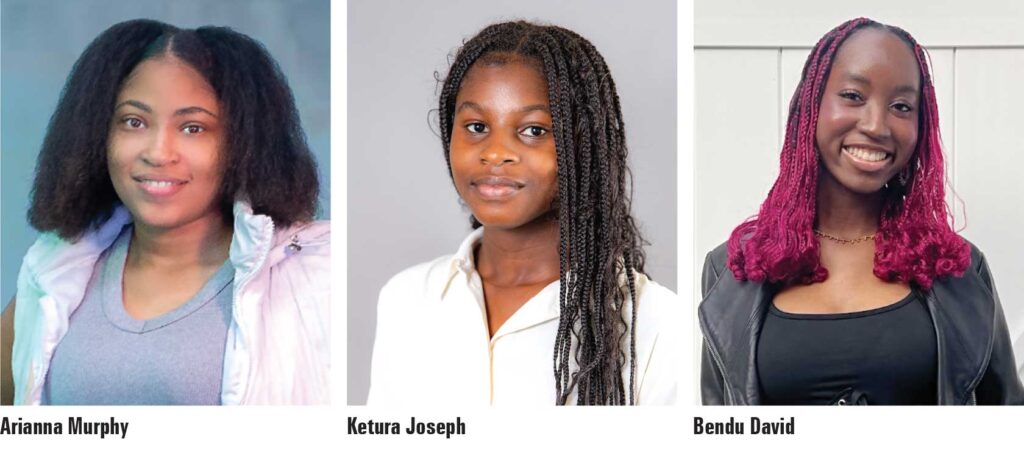
This Black History Month, the Banner is teaming up with WriteBoston’s Teens In Print program, highlighting young voices of color. Each week, we will feature the work of three new students, who will deliver their perspectives on Black History and what it means to them.
Black history is more than slavery and civil rights
by Bendu David
It’s the beginning of the school year and you’ve just entered your United States history class. As you sit at your desk you’re given a piece of paper — a syllabus that details the topics that will be covered during the school year. You skim over the contents, Pre-Colonialism, Colonization, American Revolution, U.S. Presidents, Manifest Destiny, The Great Depression, World War I, World War II, Civil Rights Movement.
You take a closer look at the Civil Rights Movement heading, which directs you to look further down the syllabus, and you see that it’s being taught for a good two weeks right before the break. As the school year goes on, you can’t help but notice that the same content being taught in 11th-grade history is the same stuff you learned in previous years. The only thing that’s changed — depending on where you live — is that you now learn Columbus did not discover the New World. When it comes to Black history, however, you realize it’s condensed to the teachings of slavery and the Civil Rights Movement, almost as if Black people don’t have history outside of these two periods.
You sit through yet another lesson about how Martin Luther King Jr. was against violence, therefore making him a better person than the oh-so-notorious Malcolm X, who you’ve never learned much about aside from his “radicalism.” You learn about Rosa Parks and how she refused to give up her seat but as you speak to a friend from another state about how you’re feeling, you come to find that they are not aware that she refused to give up her seat at all. You come to find they aren’t aware of sectionalism, or of the bus boycotts that followed.
You sit in front of your laptop and teach yourself things you were never taught in school. For example, MLK wasn’t against violent forms of resistance, Malcolm X’s views were only seen as radical because they didn’t appease white ears and Shirley Chisolm was the first African American woman to run for the presidency in a major party in 1972. You learn about how enslaved people carried on and kept faith and hope. You realize that what you’ve been learning in school is sanitized, greatly lacking in substance, and essentially inadequate information on Black history; and it has a name, the “Master Narrative.”
Now you’re left with one question: why is it that Black history is so condensed, sanitized, and incorrectly taught in schools?
Black history is inadequately taught in American schools. This, along with the Master Narrative, has resulted in a disconnect between the actual truth and what people believe to be true history. Ultimately creating an inaccurate understanding of Black history among Americans. This inadequacy further drives racial tensions and ignorance in this country.
The Master Narrative in relation to the Civil Rights Movement and Black history is a narrative that emphasizes the idea that Black people waited patiently for freedom and obtained it through nonviolent means. It’s the idea that there was a common desire to resolve conflict by working together with the oppressor. It instills that all there was to the Civil Rights Movement were peaceful protests and everything else was not as important.
This narrative places a heavy emphasis on painting Black people in a light that doesn’t present them as “radical,” hence why MLK is taught to students in a different light than Malcolm X is or how for some time Rosa Parks was described as being a tired elderly woman on the bus when in actuality her refusing her seat was very intentional.
Many Black educators feel as though the history being taught now, if not sanitized, is far too focused on violence and suffering rather than teaching issues like systematic and institutional racism or Black political figures and their achievements. A clear example of this inadequacy is how Juneteenth is not taught at all in schools. This important day in 1865 marked the day enslaved people of Galveston, Texas were freed. Juneteenth marks the end of slavery in the United States, yet so many Americans are completely unaware of this.
LaGarrett King, director of Carter Center for K-12 Black History Education at the University of Missouri, said in an article for MySunCoast, “‘White people don’t acknowledge Juneteenth, but yet we’re supposed to be a country that believes in freedom. We have been taught July 4, 1776, is the real Independence Day, but it’s not. The vast majority of Black people were still enslaved.”
Furthermore, schools across the country are not covering important aspects of Black history, such as that of the Black Panther Party, the Black Liberation Party, the Student Nonviolent Coordinating Committee (SNCC), the Southern Christian Leadership Conference (SCLC), and more. Curriculums either breeze past or don’t touch on who figures such as Stokely Carmichael, Ella Baker, and John Lewis were or what they did, and many schools do not teach about who or what COINTELPRO was and their involvement in dismantling the Black Panther Party. The history we are taught in schools is sanitized to a worrisome extent.
Now, many will argue that there isn’t enough time in the year to properly teach Black history —that there are “so many history topics to cover in American history” that an extensive focus on Black history just wouldn’t work. There is also the argument that teachers are not equipped, skilled, or knowledgeable to teach Black history. But all of these claims and statements are incorrect and prove only to be excuses created to avoid the problem that some teachers, schools, districts, and states do not want to teach Black history properly.
The idea that there are a ton of history topics is true; there is a lot to cover, and as someone who took AP U.S. history in high school, I know this to be true. Our end-of-year paper was about a topic we wish we had covered more extensively during the school year. I wrote about the Black Panther Party and how it compares today to the Black Lives Matter Movement. Upon doing my own research I found out so much information I hadn’t known before, information I had never been taught in school at the time and even now as a senior. Information that had only been touched on in one of the classes I took, which happened to be an elective exclusively taught at my school.
If there is “too much history” to teach then the only solution for this, and for all the other problems presented, is to create a national curriculum for U.S. history. This curriculum would be taught to teachers who would then — regardless of state and school district — teach it to their students. If teachers are not equipped to teach Black history, they should not be teaching at all.
The inadequacy with which Black history is taught in the U.S. and the sanitization of Black history is harmful to us. I want those reading this to leave with the understanding that even if you are a victim of these inadequacies and have been taught lessons of the Master Narrative, this is not okay and something needs to be done about it. The lack of in-depth Black history taught in schools across the United States results in professionals in fields of health, business, politics and more, as well as leaders and government officials of this country, being uneducated and ignorant of the history of the people they serve and the history of their own constituents. As we continue to see how this country continues to move, the lack of understanding and care for Black history will cause only more harm. Until a national curriculum is instituted or until states mandate that Black history be taught throughout the school year, we can only educate ourselves.
Bendu graduated from the University of Massachusetts Boston, where she studied Psychology & Gender Studies with a minor in Political Science. She is the recipient of the Rising Voices Award of WriteBoston’s Summer Journalism Institute.
Black history matters
by Ketura Joseph
As the teacher is talking, I suddenly feel a whirlwind of emotion hit me. I am no longer in history class, but instead, I am surrounded by the rich history of pre-colonial Africa, exploring the trade routes carved out by the Kongo kingdom and so much more. Suddenly, I am snapped out of my daydream and brought back to reality. Only left with a yearning for my class to dive into the culture, outfits, and economic prosperity of pre-colonial Africa. However, all I get is the basic story of enslavement. I fully understand that slavery, racism and discrimination are parts of African American history, but they should not be the only part.
The African American history that I was taught always started with slavery and nothing more. As an attempt to further my understanding of Black history, I wanted to learn about the hidden side of African history. More priority should be put on teaching African history the right way so that people won’t have to do extra research to learn what should be common information.
Abigail Tatambo, a sophomore college student at Boston University, notes that African American history she learned in high school was “Slavery and Jim Crow based.” That is a common experience shared by many in the U.S. education system.
Tatambo currently majors in health science, but she feels that she is an African American study major at heart. Tatambo is also a member of Umoja, the Black student union at Boston University. Even though she doesn’t major in African American studies, she sometimes sits in on lectures for an African religions course one of her friends is taking to further her knowledge of Black history. In one of the lectures that Tatambo attended, she learned that societies fail to understand “African spiritual religions before colonialism were actual religions.” Her sharing this memory with me furthers the point that not enough African history is taught. The lack of education in this area essentially erases the history of traditional African religions like Ifa, Santeria, Vodou, and Hoodoo by making them seem less valuable compared to more popular religions like Christianity and Islam.
Before my interview with Tatambo, I had done some research to figure out the status of African history in the whole of the U.S. According to the Princeton Summer Journal, Eunice Choi shares an important point, “Research from the SPLC further reveals…40 percent of teachers believe that states do not provide sufficient support to this instruction.” Overall, the entire U.S. is slacking on African American history. Moreover, students are not able to learn African American history in full if teachers don’t have the proper materials.
Tatambo had a different experience with African American history education because she had done debate with the focus being how debate spaces should focus more on Black women. As a result, Tatambo learned about Black and African cultural history through the research she would do on her own. However, it wasn’t always easy to find and consume this information. “It would take me days to understand what they’re saying because it’s such heavy text.” While Tatambo was researching, it would take her days to read the text since they were extremely dense, but the average normal person does not have time to take days to read a text.
Furthermore, Black history is not accessible to the public because the information is not made in a digestible way that is easy to understand after one read. Debate was an extracurricular activity that Tatambo did and that helped her further her knowledge of Black history. However, debate is not something every student can or wants to do, but that doesn’t mean that those students don’t want to learn about Black history. Tatambo shouldn’t have had to do an extracurricular just to learn about Black history because schools should be able to provide that curriculum.
Additionally, slavery and Jim Crow should not be all of Black history because it denies the existence of cultures that were and still are present in the world. Astonishingly, a few days of research taught me more about African history than my 10 years of schooling. For example, I learned about the Kongo kingdom which specialized in trade routes for ivory, copper, raffia, cloth, and pottery. I also learned about the Mali Empire, an ancient empire in West Africa, that made the first accurate astronomical calendar and traded gold, cotton, and live animals.
The active dismissal of Black history creates a negative connotation of Black history. For Tatambo, she saw the benefits of learning Black history, “It put a lot of pride in me and I just see how, like, people didn’t get that in high school.” For young Black Americans, being taught their start at slavery is devastating because how can they be proud to Black when society is trying so hard to erase their history?
Black history should be accessible, teachers should have the right materials, and the starting point should not be slavery. I realized that history is important to me because you need the past to understand the present. If people knew pre-colonial African history it would be easier to understand the complexities of slavery and even what is happening in the present. Putting more emphasis on Black history will be empowering for Black students and change the perception of people of African descent.
Ketura Joseph is currently a junior at Brooke High School. Ketura has been writing Teens in Print for three years and is currently a newsroom reporter for Teens in Print.
Five tips for surviving, thriving and staying true to yourself
by Arianna Murphy
Being a Black girl in predominantly white spaces isn’t just about showing up, it’s about surviving, thriving, and staying true to yourself. My name is Arianna, and I was raised in Boston, but my school experience has often meant navigating environments where I felt like I didn’t belong. I’ve had to learn how to hold my ground, even when I felt invisible or misunderstood. This article was born out of that struggle. This article is for every Black girl who’s ever felt out of place and who’s had to wrestle with the pressure to fit into spaces that weren’t built for them.
These five tips are my way of saying: I see you, I hear you, and I know how hard it is. Resilience is what holds it all together. It’s not just a word, it’s a weapon, a shield, a fire inside that keeps burning no matter how hard the world tries to put it out. Resilience is what we lean on when we’re told we’re “too much” or “not enough.” It’s deciding, every day, to take up space and be unapologetically ourselves. And that’s where these tips come in. They’re more than advice, they’re lifelines. Inspired by the strength of women like Sojourner Truth, these tips are a reminder that you can thrive in a world that doesn’t always welcome you. You don’t have to shrink, change, or dim your light. Let’s claim our space, tell our stories, and own our power. Now let’s get into it.
1. Own your narrative: Write your story, don’t let others define you
“Write your story, don’t let others define you” emphasizes the importance of taking control of how you are perceived by actively shaping your own story, rather than passively allowing others to interpret and narrate your life based on their perspectives, which could be inaccurate or limiting.
I found my voice as a writer when my English teacher gave me a creative writing assignment. My teachers’ positive feedback gave me the courage to keep writing about what matters to me, including my experiences as a Black girl in a mostly white school. This journey has inspired me to help others who have felt silenced or marginalized, and to amplify their voices.
Encourage authenticity and self-determination in how you present yourself to the world. Nobody gets to tell you who you are but you. I’ve had to learn this the hard way, when others try to box me into their stereotypes or limit my potential based on their expectations. I won’t let them. Like the leaders who shaped our history, I take control of my own story. You have the power to shape your own narrative too, no matter what anyone else says.
2. Speak truth to power: Use your voice, challenge injustices
Speaking truth to power and using your voice to challenge injustices is a powerful act of resistance, empowerment, and transformation that can create a ripple effect of positive change, inspire collective action, and ultimately contribute to the creation of a more just, equitable and compassionate society for all.
With fierce determination, I broke the silence, year after year, by applying for the student advisory board, fighting for a fairer and more inclusive school community. I also kept pushing for change by applying to the Student Voice Summit every year, driven by a strong passion for making things right, amplifying the voices of marginalized students, and challenging unfair systems. Despite facing rejection and disappointment many times, I stayed strong, driven by a commitment to fighting for justice, equality and the rights of all students.
Your voice matters. Don’t let anyone make you feel like your opinions or your truths don’t count. Whether it’s standing up for what’s right in class or speaking out against the things that hurt you, never let fear silence you. Rosa Parks didn’t stay quiet when injustice was staring her in the face, neither should you. If you’re passionate about something, say it loud, say it proud. To speak truth to power, start by calling out what’s wrong — even in small ways. Question what doesn’t sit right, write about it, and don’t back down. Every voice matters, and yours will be the one to change things.
3. Unapologetically you: Rock your natural hair, style, and swag
Unapologetically embracing your natural hair, style, and swag as a Black girl in an all-white school is a powerful act of self-love, empowerment and resistance that challenges Eurocentric beauty standards and inspires others to celebrate their unique identity.
After a journey of self-discovery and growth, I finally felt confident and comfortable wearing my natural hair to school, which led to enlightening conversations with my peers, including non-Black students who were curious about my braids and hair textures, and although it was initially uncomfortable, it ultimately helped to break down barriers and foster greater understanding and appreciation.
Wear your natural hair, your style, and your swag like the crown they are. Just like Angela Davis rocked her natural hair as a symbol of power, your authenticity is your rebellion, your statement to the world that you’re here, and you won’t be erased.
4. Celebrate heritage: Share Black culture, history, and triumphs
Sharing Black culture, history and triumphs is important because it allows for a more complete understanding of American society, promotes empathy and racial justice by highlighting the resilience and achievements of Black people despite historical oppression, empowers Black individuals by showcasing their heritage and role models, and provides educational opportunities for everyone to learn about an often-overlooked part of history that significantly shaped the nation.
With unbridled passion, I ignited a revolutionary celebration of Black culture, shattering systemic silence and oppression, and unleashing a thunderous declaration of African American strength, brilliance and resilience, fueling a movement that demands freedom, justice and equality.
Don’t let anyone erase the beauty and power of Black history and culture. Our stories are filled with triumphs, struggles, victories and voices that built this country. You don’t have to shrink to fit in, instead, share your culture proudly. Harriet Tubman didn’t hide her truth; she led others to freedom. Celebrate your heritage every day, and let others see the greatness you come from.
5. Find your tribe: Join Black student groups, online forums, and mentorship programs
Finding my tribe at school was a game-changer. The Black Student Alliance (BSA) became my haven, where I could share my experiences, receive support, and plan events that showcased our rich culture. Our monthly meetings were a reminder that even in a predominantly white school, my voice mattered. One of my proudest moments was organizing our first-ever diversity potluck, which brought together students from all walks of life. The room was packed, and the energy was electric. It was a powerful reminder that our differences are what make us stronger.
Outside of school, I found another tribe in Delta GEMS, a mentorship program designed to empower Black girls like me. Through this program, I’ve learned to lead with confidence, dream big, and stay true to myself. Whether it’s BSA or Delta GEMS, these spaces have taught me that I’m not alone in this journey. Together, we’re unstoppable.
HCBUs were also created as safe spaces for Black girls, where we can be our authentic selves without apology. If you’re not at an HBCU, don’t worry – your tribe is still out there. Seek out Black student groups, online forums, or mentorship programs where you can connect with like-minded sisters. Surround yourself with people who uplift, inspire and push you to be your best self. With your tribe behind you, nothing can stop you from achieving greatness.
As this article comes to an end, remember that you are part of a legacy of strong, courageous Black women who refused to be held back. Women like Rosa Parks, Harriet Tubman, who fought for their freedom, their rights, and their dignity. You too can tap into that same strength and resilience. You too can rise above the doubts, the fears and the uncertainties that may hold you back. You too can thrive in a world that often seems designed to hold you back. Remember, your voice matters. Your presence matters. Your Blackness matters. Don’t let anyone ever make you feel otherwise. So go out there and own your space. Own your voice. Own your Blackness. You are the future, and the future is bright.
Arianna Murphy is passionate about exploring the complexities of identity and culture as a mixed-race individual with both Black and Dominican heritage. She is dedicated to using her platform to raise awareness about the challenges faced by marginalized youth, particularly in mental health.

